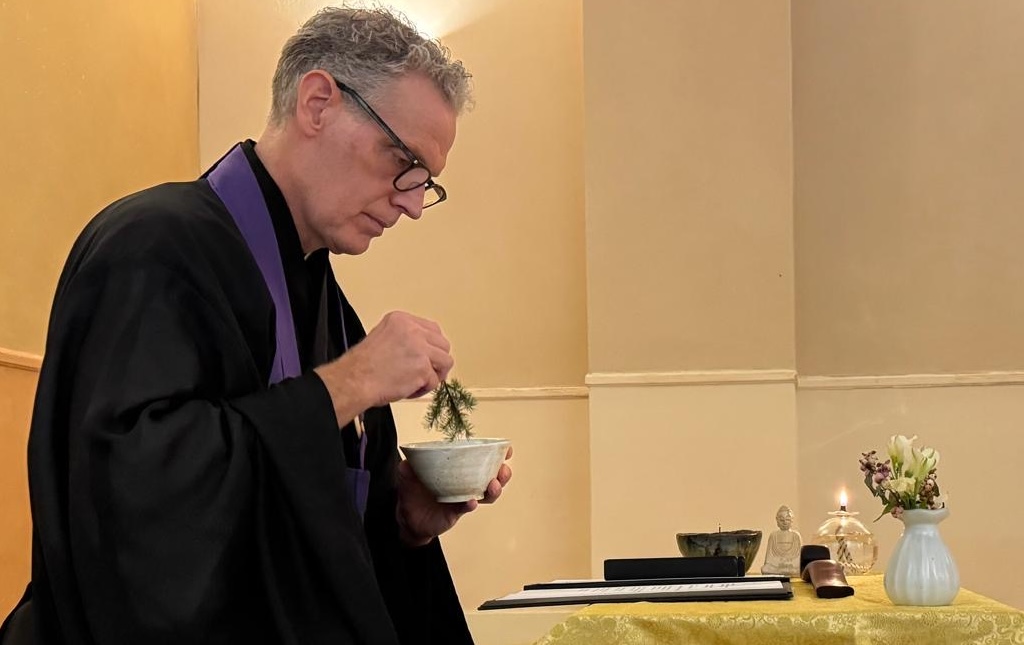
23 Sep Explained: The Jukai Ceremony
Finding refuge in Zen Buddhism
Typically, family, friends, and fellow practitioners gather for this special occasion when a member of the Sangha chooses to deepen their Zen practice. Jukai refers to taking refuge and involves making a vow to follow a personal path aligned with the Bodhisattva precepts. This commitment is about personal development, with the intention of benefiting others.
Anyone can engage in Zen practice, meditation, and study without taking Jukai. The ceremony is an optional commitment for those who feel called. It is not a graduation or a sign of having “arrived” at some spiritual destination. Instead, it marks a beginning. A commitment to examine one’s conduct, cultivate compassion, and live authentically. It is very personal: “I wish to walk the Bodhisattva path, guided by these precepts, for the benefit of myself and all beings.”
I find it a very courageous and vulnerable step, acknowledging the desire to live uprightly in a complex world.
What Is Jukai?
The word “Jukai” (受戒) comes from Japanese: “ju” means “to receive” and “kai” means “precepts” or “vows.” Jukai is the formal act of receiving sixteen guidelines, known as the Bodhisattva precepts. This ceremony is sometimes called ‘lay ordination’, but it is open to both monastics and laypeople.
Its origins reach back nearly 2,500 years to the time of the historical Buddha, Siddhartha Gautama. Early Buddhist communities established codes of conduct for monks and nuns, with hundreds of rules. For lay followers, five basic precepts formed the foundation for a moral life. As Buddhism evolved, the sixteen Bodhisattva vows were formed.
Zen master Dōgen Zenji taught us that these precepts are not mere rules, but actually a living expression of our true nature.
Today, Jukai has been passed on from teacher to student across generations and continents. I am a representative of the 84th generation of lineage holders and received the precepts from my teacher Willem Scheepers (Muishitzu Roshi), student of Nico Tydeman (Niko Tenko Roshi).
Boddhisattva
In Buddhism, a Bodhisattva is considered to be an individual who, motivated by great compassion, aspires to attain enlightenment. Not just for themselves, but for the benefit of all beings. A somewhat uncomprehensible and impossible wish so it seems.
Consider it as an internal drive to, rather than seeking personal liberation alone, help others overcome suffering. The Bodhisattva precepts can guide you to live with wisdom, generosity, and compassion in everyday life.
In taking refuge, we promise not to abandon our difficulties, but to meet them with an open heart.
With both feet on the ground.
Taking Refuge
For many, the word “refuge” evokes safety, comfort, and belonging. For me taking refuge in Zen Buddhism means turning toward the Three Treasures: the Buddha, the Dharma (teachings), and the Sangha (community). Infinite subtle sources of wisdom and support. It should not be about rigid rules or perfection. Instead, Jukai is an invitation to honest self-inquiry.
When someone asks for Jukai, it is a courageous step. Openly declaring their wish to practice compassion, a vulnerable moment. Asking for the support of their teacher, their family, friends and the community on their journey.
Symbols
During Jukai, the recipient is given a dharma name that signifies their journey. This name serves as a personal koan so to speak, intended for lifelong contemplation.
They also receive a rakusu. A small, bib-like garment representing the Buddha’s robe. It is personally sewn by hand, often with care and intention, and symbolizes simplicity, humility, and commitment. This sewing is already a practice in itself.
The Sixteen Bodhisattva Precepts
At the heart of Jukai are the "Sixteen Great Bodhisattva Precepts," which include:
The Three Jewels
Taking refuge in the Buddha, the Dharma, and the Sangha.
The Three Pure Precepts
Do no evil, do good and saving all beings.
The Ten Grave Precepts
These are more specific guidelines to practice in daily life. That’s where you find many beautiful practices to study yourself.
It is not about perfection, but honest engagement with our intentions and actions.
Jukai matters Today
It might be an ancient ceremony, but it is still a valuable tradition in Zen Buddhism. In Today’s world with uncertainty, stress, and disconnection, it offers a timeless refuge. For me, it is deepening my Zen practice every day. To learn how to meet my, and everyone’s suffering: with compassion and clarity. It encourages me to look honestly at myself, my habits, beliefs, and patterns, without harsh judgment. In taking refuge, we promise not to abandon our difficulties, but to meet them with an open heart.
With both feet on the ground.


